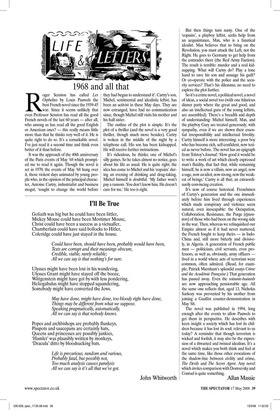1968 and all that
Roger Scruton has called Les Orphelins by Louis Pauwels the best French novel since the 1939-45 war. Since it seems unlikely that even Professor Scruton has read all the good French novels of the last 60 years — after all, who among us has read all the good English or American ones? — this really means little more than that he thinks very well of it. He is quite right to do so. It’s a remarkable novel. I’ve just read it a second time and think even better of it than before.
It was the approach of the 40th anniversary of the Paris events of May ’68 which prompted me to read it again. Though the novel is set in 1970, the events of May ’68 hang over it, those violent days animated by young people who, in the opinion of the principal character, Antoine Cartry, industrialist and business mogul, ‘sought to change the world before they had begun to understand it’. Cartry’s son, Michel, sentimental and idealistic leftist, has been an activist in these May days. They are now estranged, have had no communication since, though Michel still visits his mother and his half-sister.
The outline of the plot is simple. It’s the plot of a thriller (and the novel is a very good thriller, though much more besides). Cartry is woken in the middle of the night by a telephone call. His son has been kidnapped. He will receive further instructions.
It’s ridiculous, he thinks; one of Michel’s silly games. So he takes almost no notice, goes about his life as usual. He is quite right; the idea has come to Michel and his ‘copains’ during an evening of drinking and drug-taking. Michel himself is doubtful. ‘My father won’t pay a ransom .You don’t know him. He doesn’t care for me.’ He too is right. But then things turn nasty. One of the ‘copains’, a playboy leftist, seeks help from an acquaintance, Max, who is a fanatical idealist. Max believes that to bring on the Revolution, you must attack the Left, not the Right. He goes to Germany to get help from the comrades there (the Red Army Faction). The result is terrible: murder and a real kidnapping. What will Cartry do? Play a lone hand to save his son and assuage his guilt? Or co-operate with the police and the security services? That’s his dilemma; no need to explore the plot further.
So it’s a crime novel, a political novel, a novel of ideas, a social novel too (with one hilarious dinner party where the great and good, and also an intellectual guru of the young leftists, are assembled). There’s a breadth and depth of understanding: Michel himself, Max, and the playboy Gary are treated generously, with sympathy, even if we are shown their essential irresponsibility and intellectual frivolity. Cartry himself is more interesting: a poor boy who has become rich, self-confident, now tested as never before. The novel has an epigraph from Tolstoy’s Journal: ‘How good it would be to write a work of art which clearly expressed man’s fluidity, that fact that, while remaining himself, he is now a villain, now an angel, now a sage, now an idiot, now strong, now the weakest of beings.’ Cartry is all that; an extraordinarily convincing creation.
It’s now of course historical. Frenchmen of Cartry’s generation and the one immediately before him lived through experiences which made conspiracy and violence seem natural, even inescapable: the Occupation, Collaboration, Resistance, the Purge (épuration) of those who had been on the wrong side in the war. Then, whereas we relinquished our Empire almost as if it had never mattered, the French fought to keep theirs — in IndoChina and, still more bitterly and divisively, in Algeria. A generation of French public men — politicians, civil servants, even professors, as well as, obviously, army officers — lived in a world where acts of terrorism were common, often admired. (Read, for example, Patrick Marnham’s splendid essays Crime and the Académie Française.) That generation has passed away. Even the soixante-huitards are now approaching pensionable age. All the same one reflects that, aged 13, Nicholas Sarkozy was prevented by his mother from joining a Gaullist counter-demonstration in May ’68.
The novel was published in 1994, long enough after the events to allow Pauwels to get them in perspective. He describes with keen insight a society which has lost its children because it has lost its soul; relevant to us today? A reminder that though terrorism is wicked and foolish, it may also be the expression of a thwarted and twisted idealism. It’s a novel which makes you both think and feel at the same time, like those other evocations of the shadow-line between civility and crime, The Devils and The Secret Agent. Any novel which invites comparison with Dostoevsky and Conrad is quite something.
Allan Massie










































































 Previous page
Previous page